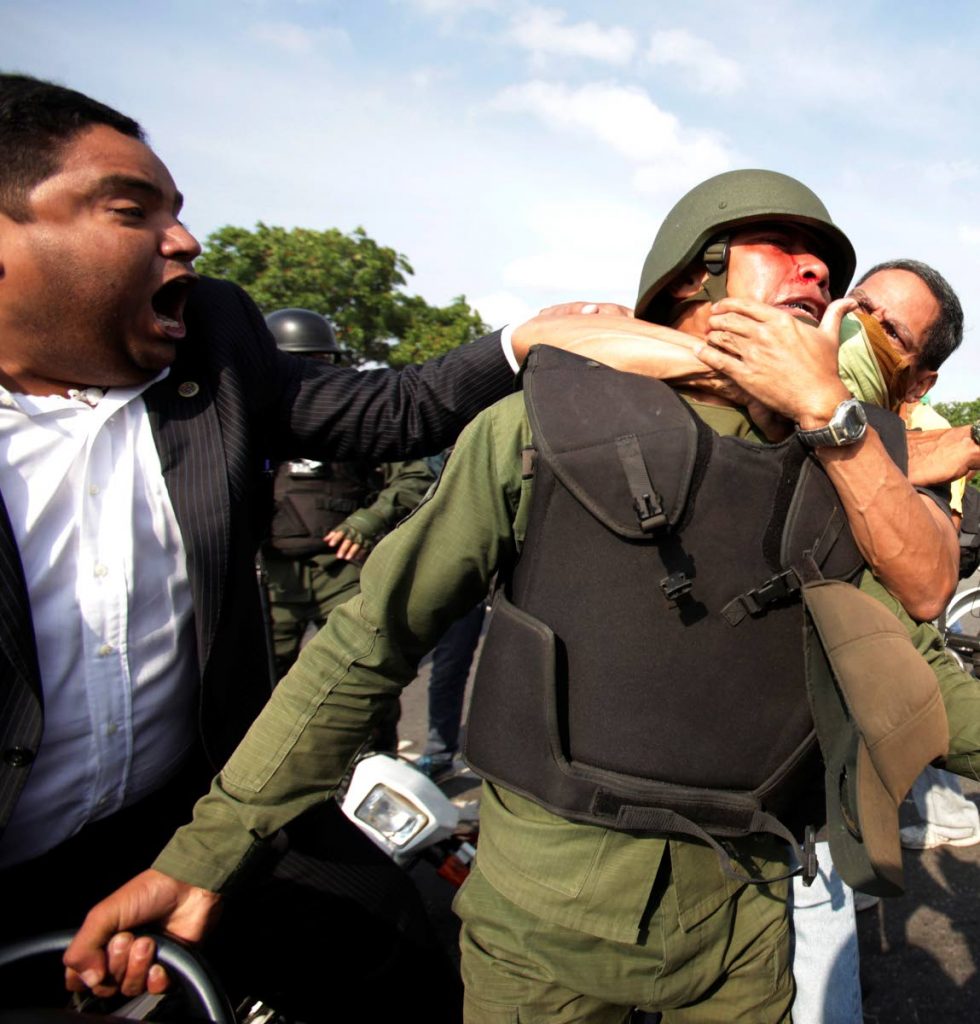STREETS OF RAGE

CARACAS: The streets of Venezuela's capital Caracas was stained with blood and littered with tear gas cannisters as Opposition leader Juan Guaidó took a bold step to lead a coup attempt to overthrow President Nicolas Maduro and his regime.
Guaido took to the streets as he called for a military uprising which drew quick support from the Trump administration but also fierce resistance from forces loyal to embattled socialist Maduro.
Violent street battles erupted in parts of Caracas in what was the most serious challenge yet to Maduro's rule — kicked off with a video shot at dawn of Guaidó, flanked by several heavily armed national guardsmen, urging a final push to topple Maduro.
In one dramatic incident during a chaotic day, several armored vehicles plowed into a group of anti-government demonstrators trying to storm the capital's air base, hitting at least two protesters. Still, the rebellion, dubbed "Operation Freedom," seemed to have garnered only limited military support.
Meanwhile, US National Security Advisor John Bolton said the Trump administration was waiting for three key officials, including Maduro's defense minister and head of the supreme court, to act on what he said were private pledges to remove Maduro. He did not provide details.
The dramatic events began when Guaidó, flanked by a few dozen national guardsmen and some armored crowd-control vehicles, released the three-minute video shot near the Carlota air base.
In a surprise, Leopoldo Lopez, Guaido's political mentor and the nation's most-prominent opposition activist, stood alongside him. Detained in 2014 for leading a previous round of anti-government unrest, Lopez said he had been released from house arrest by security forces adhering to an order from Guaidó.
"TAKE TO
THE STREETS"
"I want to tell the Venezuelan people: This is the moment to take to the streets and accompany these patriotic soldiers," Lopez declared.
As the two opposition leaders coordinated actions from a highway overpass, troops loyal to Maduro fired tear gas from inside the adjacent air base.
A crowd that quickly swelled to a few thousand scurried for cover, reappearing later with Guaidó at a plaza a few blocks from the disturbances. A smaller group of masked youths stayed behind on the highway, lobbing rocks and Molotov cocktails toward the air base and setting a government bus on fire.
Amid the mayhem, several armored utility vehicles careened over a berm and drove at full speed into the crowd. Two demonstrators, lying on the ground with their heads and legs bloodied, were rushed away on a motorcycle as the vehicles sped away dodging fireballs thrown by the demonstrators.
"It's now or never," said one of the young rebellious soldiers, his face covered in the blue bandanna worn by the few dozen insurgent soldiers.
The head of a medical center near the site of the street battles said doctors were treating 50 people, about half of them with injuries suffered from rubber bullets. At least one person had been shot with live ammunition.
Later Tuesday, Lopez and his family sought refuge in the Chilean ambassador's residence in Caracas, where another political ally has been holed up for over a year. There were also reports that 25 troops who had been with Guaidó fled to Brazil's diplomatic mission.
"NERVES
OF STEEL"
Amid the confusion, Maduro tried to project an image of strength, saying he had spoken to several regional military commanders who reaffirmed their loyalty. "Nerves of steel!" he said in a message posted on Twitter.
Flanked by top military commanders, Defense Minister Vladimir Padrino López condemned Guaido's move as a "terrorist" act and "coup attempt" that was bound to fail like past uprisings.
"Those who try to take Miraflores with violence will be met with violence," he said on national television, referring to the presidential palace where hundreds of government supporters, some of them brandishing firearms, had gathered in response to a call to defend Maduro.
Guaidó said he called for the uprising to restore Venezuela's constitutional order, broken when Maduro was sworn in earlier this year for a second term following elections boycotted by the opposition and considered illegitimate by dozens of countries.
As events unfolded, governments from around the world expressed support for Guaidó while reiterating calls to avoid violent confrontation.
Bolton declined to discuss possible actions — military or otherwise — but reiterated that "all options" are on the table as President Donald J. Trump monitors developments "minute by minute." Elsewhere, Spain's socialist caretaker government urged restraint, while the governments of Cuba and Bolivia reiterated their support for Maduro.
(See Page 5A)

Comments
"STREETS OF RAGE"